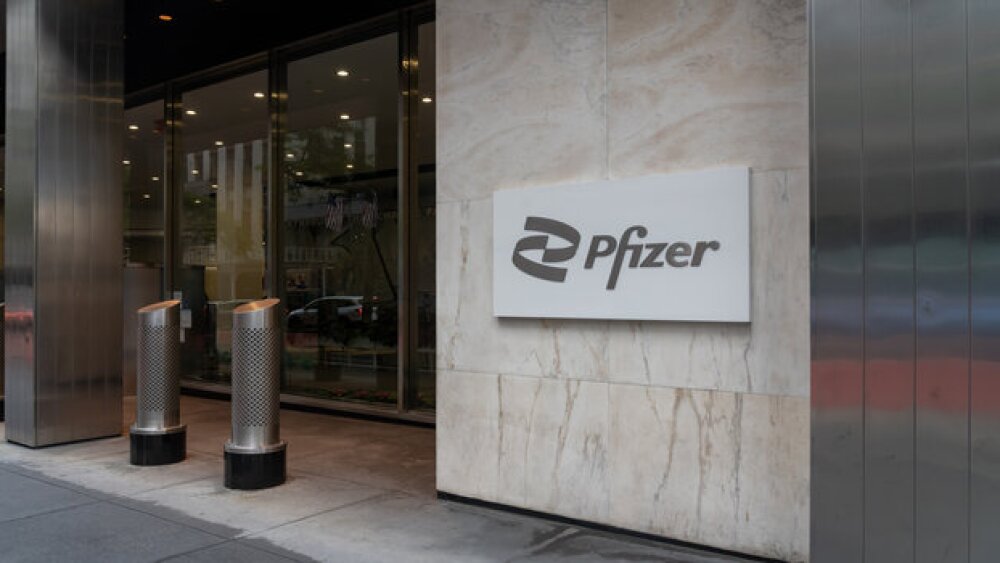The regulator approved the combination of Pfizer’s Braftovi and Mektovi for the treatment of metastatic non-small cell lung cancer in adult patients with a BRAF V600E mutation.
Pictured: Pfizer’s world headquarters in New York/iStock, JHVEPhoto
Pfizer secured FDA approval for its drug combo of encorafenib and binimetinib, marketed as Braftovi and Mektovi, to treat metastatic non-small cell lung cancer with a BRAF V600E mutation in adult patients.
The approval was granted on the basis of promising data from the ongoing Phase II Pharos Clinical Trial, in which the drug combo met its major outcome efficacy measure of objective response rate (ORR) in both treatment groups.
The FDA’s approval “builds on our long-standing commitment to deliver innovative, personalized medicines to patients with lung cancer,” Chris Boshoff, executive vice president at Pfizer, said in a statement. “Since its initial FDA approval in 2018, Braftovi and Mektovi combination therapy has helped thousands of people living with BRAF V600E-or V600K-mutant unresectable or metastatic melanoma.”
The ongoing Phase II study is looking at the combination therapy for a total cohort of 98 patients, both treatment-naive and previously treated patients with metastatic non-small cell lung cancer (NSCLC). The BRAF V600E mutations in particular present “an actionable biomarker that precision medicines like Braftovi and Mektovi combination therapy can help address,” Gregory Riely, vice chair of clinical research at Memorial Sloan Kettering Cancer Center and investigator in the Pharos trial, said in a statement.
The drugs are both kinase inhibitors, which is what made them a target treatment for NSCLC with this mutation, as it stimulates tumor cell proliferation and growth by altering the MAP kinase pathway.
While NSCLC represents 80% to 85% of all lung cancers, which is the second most common type of cancer and the number one cause of cancer-related death, BRAF V600E mutations occur in roughly 2% of cases. Biomarkers such as this, however, give drug makers particular targets, meaning “treatment can become more personalized and effective, since the molecular makeup of a person’s cancer often determines how they respond to different therapies,” Pfizer said in its announcement.
The data were published in the Journal of Clinical Oncology this year and presented at the annual meeting of the American Society of Clinical Oncology. They showed an ORR of 75% in treatment-naive patients and 46% for previously treated patients. The data also showed that 59% of treatment-naive patients responded for at least 12 months, while 33% of previously treated patients responded for at least 12 months, with an overall median duration of response of 16.7 months.
However, serious adverse reactions occurred in 38% of patients, most commonly including hemorrhage, diarrhea, anemia, dyspnea, and pneumonia. Fatal adverse reactions occurred in 2% of patients, including intracranial hemorrhage, and myocardial infarction. In total, 17% of patients were permanently discontinued on treatment of Mektovi after adverse reactions, and 16% of patients experienced the same on Braftovi.
The FDA approval follows the approval of Novartis’ NSCLC drug combo of dabrafenib and trametinib, marketed as Tafinlar and Mekinist respectively, for the treatment of NSCLC cancers with a BRAF V600E mutation in 2017. That drug combo has scored numerous wins and is currently approved by the FDA for treatment of six different BRAF V600E mutation-related solid tumor cancers, including melanoma, thyroid cancer, and pediatric brain cancer.
Connor Lynch is a freelance writer based in Ottawa, Canada. Reach him at lynchjourno@gmail.com.





